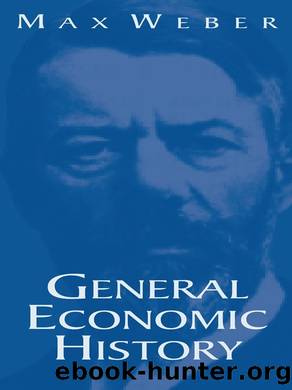General Economic History by Weber Max;

Author:Weber, Max; [Weber, Max]
Language: eng
Format: epub
ISBN: 1900403
Publisher: Dover Publications
Published: 2012-10-23T00:00:00+00:00
(B) THE RESIDENT TRADER
The conditions pictured in the preceding section apply not only to the trade of the early middle ages but also to Arabia and the world in general, so long as the foreign trader predominates. Totally different conditions arose when the class of resident merchants developed.
Typically, the phenomenon of the resident trader is a product of the development of towns, although undoubtedly there were resident merchants previously, in the market settlements in the neighborhood of fortresses. The resident merchant was technically designated mercator. By this term the middle ages understood a trader who had acquired the privilege of settlement in the town, and primarily a retailer, whether he sold his own products or those of foreigners. In certain legal sources the term is used as equivalent to merchant in modern commercial law; a mercator is one who buys and sells, lucri causa. But this usage, which appears especially in Rhenish documents, cannot be taken as the common one for the middle ages. In the population structure of the medieval towns the mercator was not a wholesaler but rather anyone who brought something to market, the craftsman as well as the professional trader.
The professional trading class of the towns developed in the following way. The resident merchant is to begin with an itinerant trader. He travels periodically in order to market products at a distance or to secure products from a distance and is a peddler who has acquired a fixed residence. The next stage is that in which he has the traveling done for him, either by an employee or servant or by a partner; the one arrangement goes over into the other. The third stage is formed by the system of factories. The trader has increased in capital power to a point where he founds independent settlements at distant points, or at least maintains employees there, and so establishes an interlocal system of relations. Finally, the resident trader becomes completely fixed in his location and deals with distant regions by correspondence only. This condition did not become possible until the late middle ages because there was not suffeient interterritorial legal security.
The center of gravity in medieval trade lies in retailing. Even the merchant who brought in goods from a distance, as from the orient, centered his interest in selling directly to the consumers. The risk was less, the gain more steady and secure, and in general higher than would have been the case with wholesale trade, and the business possessed in a degree a monopolistic character. Even the Hansards were not merchants in the present sense, but emphasized chiefly the control of retail trade in foreign lands, seeking to exclude foreign competition in retailing in Russia, Sweden, Norway, and England. Even in the 16th century the Merchant Adventurers in England, to whom Elizabeth granted privileges, pursued this policy. Wholesalers in the proper sense perhaps did not exist at all in the early middle ages, and toward the end of the period only in small and slowly increasing
Download
This site does not store any files on its server. We only index and link to content provided by other sites. Please contact the content providers to delete copyright contents if any and email us, we'll remove relevant links or contents immediately.
| Automotive | Engineering |
| Transportation |
Whiskies Galore by Ian Buxton(42016)
Introduction to Aircraft Design (Cambridge Aerospace Series) by John P. Fielding(33131)
Small Unmanned Fixed-wing Aircraft Design by Andrew J. Keane Andras Sobester James P. Scanlan & András Sóbester & James P. Scanlan(32802)
Craft Beer for the Homebrewer by Michael Agnew(18246)
Turbulence by E. J. Noyes(8053)
The Complete Stick Figure Physics Tutorials by Allen Sarah(7373)
The Thirst by Nesbo Jo(6944)
Kaplan MCAT General Chemistry Review by Kaplan(6934)
Bad Blood by John Carreyrou(6623)
Modelling of Convective Heat and Mass Transfer in Rotating Flows by Igor V. Shevchuk(6441)
Learning SQL by Alan Beaulieu(6291)
Weapons of Math Destruction by Cathy O'Neil(6281)
Man-made Catastrophes and Risk Information Concealment by Dmitry Chernov & Didier Sornette(6020)
Digital Minimalism by Cal Newport;(5765)
Life 3.0: Being Human in the Age of Artificial Intelligence by Tegmark Max(5558)
iGen by Jean M. Twenge(5417)
Secrets of Antigravity Propulsion: Tesla, UFOs, and Classified Aerospace Technology by Ph.D. Paul A. Laviolette(5372)
Design of Trajectory Optimization Approach for Space Maneuver Vehicle Skip Entry Problems by Runqi Chai & Al Savvaris & Antonios Tsourdos & Senchun Chai(5069)
Pale Blue Dot by Carl Sagan(5010)
